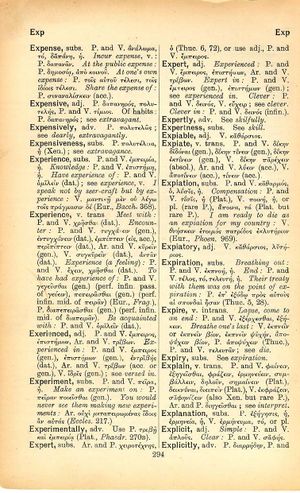expense: Difference between revisions
From LSJ
Ὁ δὲ μὴ δυνάμενος κοινωνεῖν ἢ μηδὲν δεόμενος δι' αὐτάρκειαν οὐθὲν μέρος πόλεως, ὥστε ἢ θηρίον ἢ θεός → Whoever is incapable of associating, or has no need to because of self-sufficiency, is no part of a state; so he is either a beast or a god
m (Text replacement - "}}]]" to "}}]]") |
m (Text replacement - "(|thumb)\n(\|link=)" to "$1$2") |
||
| Line 1: | Line 1: | ||
{{Woodhouse1 | {{Woodhouse1 | ||
|Text=[[File:woodhouse_294.jpg|thumb | |Text=[[File:woodhouse_294.jpg|thumb|link={{filepath:woodhouse_294.jpg}}]]'''subs.''' | ||
|link={{filepath:woodhouse_294.jpg}}]]'''subs.''' | |||
P. and V. [[ἀνάλωμα]], τό, [[δαπάνη]], ἡ. | P. and V. [[ἀνάλωμα]], τό, [[δαπάνη]], ἡ. | ||
<b class="b2">Incur expense</b>, v.: P. δαπανᾶν. | <b class="b2">Incur expense</b>, v.: P. δαπανᾶν. | ||
Revision as of 17:05, 18 May 2020
English > Greek (Woodhouse)
subs.
P. and V. ἀνάλωμα, τό, δαπάνη, ἡ. Incur expense, v.: P. δαπανᾶν. At the public expense: P. δημοσίᾳ, ἀπὸ κοινοῦ. At one's own expense: P. τοῖς αὑτοῦ τέλεσι, τοῖς ἰδίοις τέλεσι. Share the expense of: P. συναναλίσκειν (acc.).
Latin > English (Lewis & Short)
expensē: adv., v. expendo.
Latin > French (Gaffiot 2016)
expēnsē (expensus), beaucoup, fortement : Ps. Th. Prisc. Diæt. 15.
Latin > German (Georges)
expēnsē, Adv. (expendo), reichlich, sehr, Th. Prisc. de diaeta 15.

